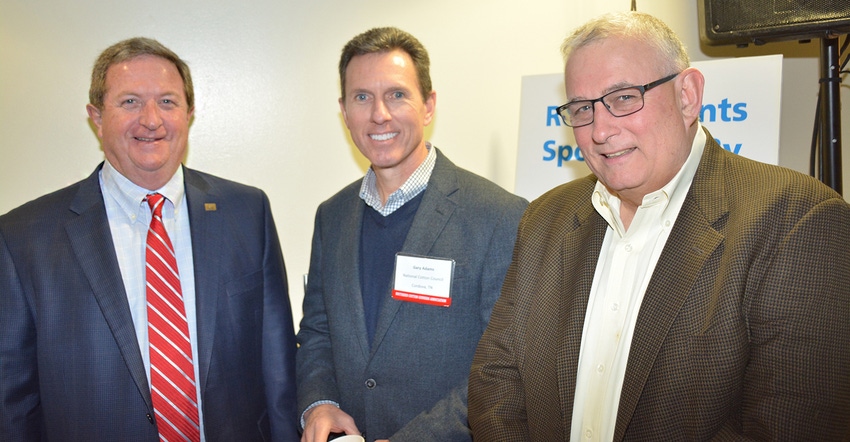
With active farmers making up less than 2 percent of the U.S. population it’s more important than ever that commodity groups present a united front when it comes to passing new farm legislation.
But two groups who stand to gain – or lose – the most from the rewriting of the commodity title of the farm bill that gets passed, hopefully, in 2017 or 2018 are getting off to a bad start on legislation such as the FY2017 omnibus appropriation bill.
National Cotton Council leaders have been working for weeks to persuade congressional negotiators to include their new cottonseed policy in the budget compromise that was approved the weekend of April 29-30. (Language establishing cottonseed as an “other oilseed” would make cotton producers eligible for Price Loss Coverage in the 2014 farm bill.)
But the cotton policy initiative ran into opposition from dairy state senators who tried and failed to get a similar assistance program for dairy producers who have seen milk prices fall due to surplus production.
NCC Chairman Ronnie Lee, a producer from Bronwood, Ga., singled out two of those senators – Patrick Leahy of Vermont and Debbie Stabenow of Michigan – who he said “chose to play politics at the expense of cotton producers and farm families.”
Broadly supported by stakeholders
Lee named several reasons the cottonseed policy should have bene added to the omnibus appropriation bill, which must be passed by the House and Senate by Friday (May 5) to avoid a government shutdown.
It was: 1) broadly supported by the entire U.S. cotton industry, as well as many other farm bill stakeholders; 2) budget neutral with the costs offset only by cotton-related provisions; 3) vetted and supported by a broad, bipartisan group in Congress; and 4) designed to help facilitate development of the 2018 farm bill.
The $800 million plan to provide dairy assistance plan promoted by Senators Stabenow and Leahy, on the other hand, “was cobbled together at the last minute, unvetted, and totally unpaid for,” according to Lee and Rep. Mike Conaway of Texas.
“It is no secret that times are extremely difficult in farm and ranch country right now, with net farm income down 50 percent from where it stood just four years ago. It is also no secret that the safety net for cotton and dairy is failing our producers,” said Conaway, the chairman of the House Agriculture Committee.
“To its credit, the entire cotton industry came together on a plan to fix what is broken with respect to the safety net for cotton farmers.”
‘Pre-requisite for policy’
“The Senators’ desire to help dairy producers somehow became a pre-requisite for whether Congress could provide a policy to cotton producers to help respond to the ongoing financial and trade policy challenges,” Lee said. “There was no rationale or justification for linking support between cotton and dairy producers.
“These actions not only have left cotton producers with no near-term options to help them deal with long-running economic issues, but have harmed the prospects for developing a new farm bill. Without the cottonseed policy in place, the result is that all farm bill stakeholders will be seeking support from an expected smaller overall budget available for the next farm bill.”
“I am extremely disappointed in the recklessness and heartlessness of such an approach. For the sake of both America's cotton and dairy farmers,” said Conaway. “I hope that all lawmakers will come together on policies broadly supported by those they are designed to help, thoroughly vetted, and fully paid for. Senators Stabenow and Leahy should not be playing games with the livelihoods of those who work hard to put food on our tables and clothes on our backs.”
Sen. Stabenow’s office was asked about the comments but had not responded at press time.
Lee said support for the NCC’S cottonseed policy came from a number of senators, including Thad Cochran of Mississippi, John Cornyn of Texas, John Boozman of Arkansas, David Perdue of Georgia, Pat Roberts of Kansas and Luther Strange of Alabama and Reps. Conaway, Colin Peterson of Minnesota, Robert Aderholt of Alabama, Sanford Bishop of Georgia, Kevin McCarthy of California, Rodney Frelinghuysen of New Jersey and Nita Lowey (D-NY).
Shift in focus
“The NCC will now shift its focus to working with Secretary Perdue to determine what administrative options USDA has to help cotton producers,” said Lee. “Our industry will remain optimistic that the economic well-being of farm families and our rural communities will ultimately prevail over Congressional politics.”
The cottonseed policy was developed by all of the cotton industry’s segments and production regions over the course of the past two years. A letter from 58 cotton organizations was recently sent to Appropriations Committee leaders outlining this policy and the immediate need for it. The letter is on the NCC’s website at http://www.cotton.org/issues/2017/upload/17cseedapplet.pdf.
About the Author(s)
You May Also Like






